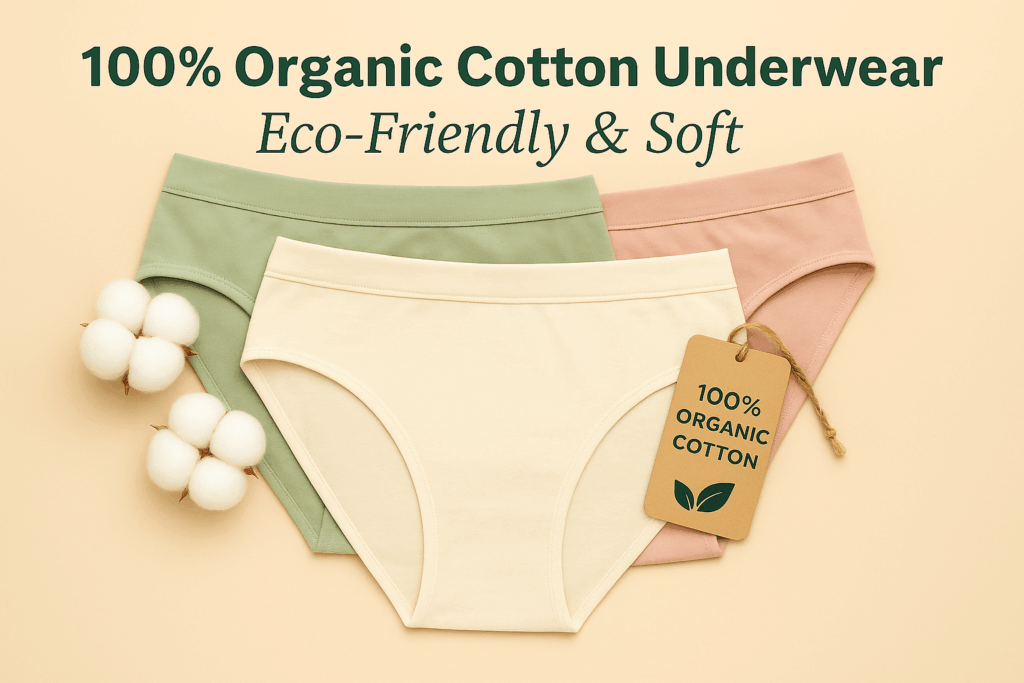Choosing underwear might seem straightforward, but when you consider organic cotton options, it’s about more than just comfort—it’s about your health and the planet. Organic cotton underwear is becoming the go-to for conscious consumers who want softness, breathability, and environmental responsibility all rolled into one. Let’s dive into what makes this choice truly special.

Understanding What Organic Cotton Underwear Is and Why It Matters
Organic cotton underwear isn’t just cotton labeled “organic.” It comes from cotton plants grown without synthetic pesticides, fertilizers, or genetically modified organisms (GMOs). This farming method helps keep soil and water cleaner and protects farmers from harmful chemicals [1].
When you slip into organic cotton underwear, you’re wearing fabric that’s softer and naturally breathable, thanks to the absence of harsh chemicals in its growth and processing. Plus, organic cotton cultivation uses significantly less water compared to conventional cotton farming, which—surprisingly, given cotton’s reputation—is a huge win for water conservation [2].
Why does all this matter? Well, the fashion industry can be a major polluter, and underwear is surprisingly impactful. Supporting organic cotton means fewer chemicals leaching into ecosystems and less overall environmental damage during production. That makes your buying decision kind of a quiet little act of eco-heroism. Beyond environmental benefits, many find organic cotton causes fewer skin irritations and allergies, especially for sensitive skin types [3].
So, wearing organic cotton underwear isn’t just a style choice—it’s about supporting health, comfort, and a cleaner planet.
What Defines Organic Cotton and How It’s Cultivated
You might ask, what sets organic cotton apart at the farm level? Organic cotton is cultivated with crop rotations, natural pest control, and compost fertilizers. These methods strike a balance with nature, promoting biodiversity and improving soil quality over time [4].
Conventional cotton farming often involves pesticides that remain hazardous to soil and water even after harvest. Organic farms avoid these toxins, creating a safer environment not just for farmers but also for the communities nearby. When you know this, wearing organic cotton feels like a connection to a more sustainable, mindful way of farming.
Key Environmental Benefits of Choosing Organic Cotton Underwear
Organic cotton underwear offers several environmental perks:
- Reduced Water Usage: Organic cotton farming uses about 91% less water than conventional cotton [2].
- Lower Carbon Footprint: Less chemical processing means fewer greenhouse gas emissions [1].
- Healthier Soils: Natural composting improves soil fertility and reduces erosion [4].
- Biodiversity Protection: Chemical-free fields support local wildlife and plants better [3].
By choosing organic, you’re stacking the deck in favor of a healthier Earth without sacrificing the comfort of your daily essentials. That’s worth feeling good about.
How Organic Cotton Underwear Enhances Comfort and Supports Health

If comfort matters most to you—organic cotton underwear wins here. The fabric is naturally soft, breathable, and hypoallergenic. That means it’s less likely to irritate sensitive skin or cause allergies, which is especially important for underwear as it’s in close and constant contact with delicate skin [3].
What’s cool is that organic cotton naturally wicks moisture, helping prevent that uncomfortable clammy feeling many experience wearing synthetic blends. And since it’s less processed, it retains more of those natural fibers that breathe and keep you comfortable throughout the day [5].
Essential Features to Consider When Selecting Organic Cotton Underwear
Alright, moving on—how do you choose the right organic cotton underwear for you? Not all organic cotton products are created equal, so here’s what matters.
What Fabric Quality and Softness Mean for Your Comfort
You want underwear that feels cozy all day long. Organic cotton quality depends on factors like the fiber length and weaving technique. Longer cotton fibers yield softer and more durable fabric, while tight weaves improve smoothness against the skin [6].
Look for terms like “ring-spun” or “combed cotton” on labels — these usually mean better softness and fewer rough fibers. Also, be aware that fabric finishing methods matter; some brands avoid harsh chemicals even in fabric softening, sticking to organic or natural finishes, which makes a big difference in that gentle feel [4].
Why Breathability and Moisture-Wicking Matter in Underwear
Breathability prevents moisture buildup, which can lead to discomfort, irritation, or even infections in sensitive areas. Organic cotton’s natural fiber structure allows air flow, making it inherently breathable [5].
Moreover, organic cotton’s moisture-wicking properties pull sweat away from the skin, reducing dampness. This is especially useful if you live in a hot climate or lead an active lifestyle. Unlike some synthetic fabrics, organic cotton won’t trap heat or moisture, keeping you feeling fresh [5].
How to Verify Certifications and Ethical Production Standards
Since “organic” can sometimes be just a marketing buzzword, it’s crucial to verify certifications. Look for globally recognized labels, including:
- GOTS (Global Organic Textile Standard): Covers organic fiber content, environmental impact, and social criteria [7].
- OEKO-TEX: Tests for harmful substances, ensuring fabrics are safe for skin [8].
- Fair Trade: Confirms ethical labor practices.
Brands that openly share their production processes and certification details are more trustworthy. Don’t hesitate to check their websites or ask questions—transparency is key for sustainability.
Comparing Organic Cotton Underwear to Conventional Alternatives
So how does organic really stack up against standard cotton underwear? Let’s look beyond the marketing.
Environmental Impact: Organic Versus Conventional Cotton Farming
Conventional cotton farming is a resource hog: it’s responsible for about 24% of insecticide use worldwide despite occupying 2.5% of cultivated lands, and it uses significant water which puts stress on local ecosystems [1]. Organic cotton farming avoids synthetic chemicals altogether and uses water more efficiently, reducing pollution and runoff [2].
One study showed organic cotton farming reduces greenhouse gas emissions by roughly 30%, an important factor when thinking about climate change [1]. If you want underwear that’s lighter on the planet, organic is the clear winner.
Comfort and Durability Factors Between Organic and Traditional Underwear

Organic cotton underwear tends to be softer and less irritating because it’s free from chemical residues. However, some wearers notice that organic cotton undergarments might feel a bit different initially—sometimes less stretchy or a little firmer—because brands avoid synthetic fibers for elasticity [6].
Durability-wise, properly cared for organic cotton garments can last as long or longer than conventional ones. Their natural fibers are strong, and when combined with high-quality fabric construction, they hold up well against repeated washing [6].
Price Differences and Accessibility for Organic Cotton Options
Price is often a sticking point. Organic cotton underwear usually costs more due to higher farming, certification, and ethical production expenses. It might be 20–40% pricier than conventional cotton underwear [9]. But many customers consider this an investment in health and environmental impact.
Availability is increasing as more brands embrace sustainability. You can now find organic cotton underwear in mainstream stores and online marketplaces with competitive pricing options, sometimes even on par with premium conventional brands [9].
How to Properly Care for Your Organic Cotton Underwear to Maximize Longevity
Want your organic cotton underwear to last? Good care goes a long way.
Best Practices for Washing and Drying to Preserve Fabric Quality
Wash your organic cotton underwear in cold or lukewarm water with mild detergent—avoid bleach or harsh chemicals that break down fibers [10]. Using a gentle cycle protects fabric integrity.
Air drying is best to prevent shrinkage and fabric stress. If you must use a dryer, tumble dry on low heat only. These steps keep your underwear soft and comfortable, plus they save energy [10].
Effective Storage and Handling Tips to Maintain Underwear Condition
Store underwear in a cool, dry place. Avoid cramming drawers so fabric doesn’t get stretched or misshaped. Folding neatly and keeping away from direct sunlight prevents fading and fiber damage.
Rotate your underwear regularly to avoid overusing certain pairs, extending overall wardrobe life.
Where to Find Organic Cotton Underwear and How to Choose the Right Brand
You’re sold on organic cotton underwear—now what?
Trusted Brands Specializing in Organic Cotton Underwear
Several brands have earned stellar reputations for quality and sustainability:
- PACT: Fair Trade certified, GOTS organic cotton, and very transparent about production practices [7].
- Boody: Uses organically grown bamboo cotton blends focusing on softness and sustainability.
- Organic Basics: Combines eco-friendly fabrics with durability and ethical manufacturing standards.
You can find many of these online or in eco-conscious retailers.
What to Look for in a Brand’s Commitment to Sustainability and Transparency
Aside from certifications, look for brands that:
- Publicly share supply chain details.
- Use recyclable, minimal packaging.
- Engage in fair labor practices.
- Promote environmental responsibility beyond just “organic cotton.”
These indicators ensure your purchase aligns with your values and makes a positive impact [7].
Answering Common Questions About Organic Cotton Underwear
Is Organic Cotton Underwear a Good Choice for Sensitive Skin?
Absolutely. Organic cotton avoids pesticides and dyes that can trigger irritation, making it hypoallergenic and ideal for sensitive skin, eczema, or allergy-prone users [3]. Many dermatologists recommend it for intimate wear.
Does Organic Cotton Help Reduce Allergies and Skin Irritations?
Yes. Without chemical residues, organic cotton reduces contact with allergens. Studies show reduced irritation and better skin tolerance with organic cotton pads and underwear, especially for women with vulvar sensitivities [3],[11].
Can Wearing Organic Cotton Underwear Make a Significant Environmental Difference?
Yes! Choosing organic cotton supports farming methods that reduce chemical runoff, lower water and energy use, and cut emissions. While underwear alone won’t solve climate change, your choice contributes to increased demand for sustainable textiles, encouraging industry-wide change [1],[2].
